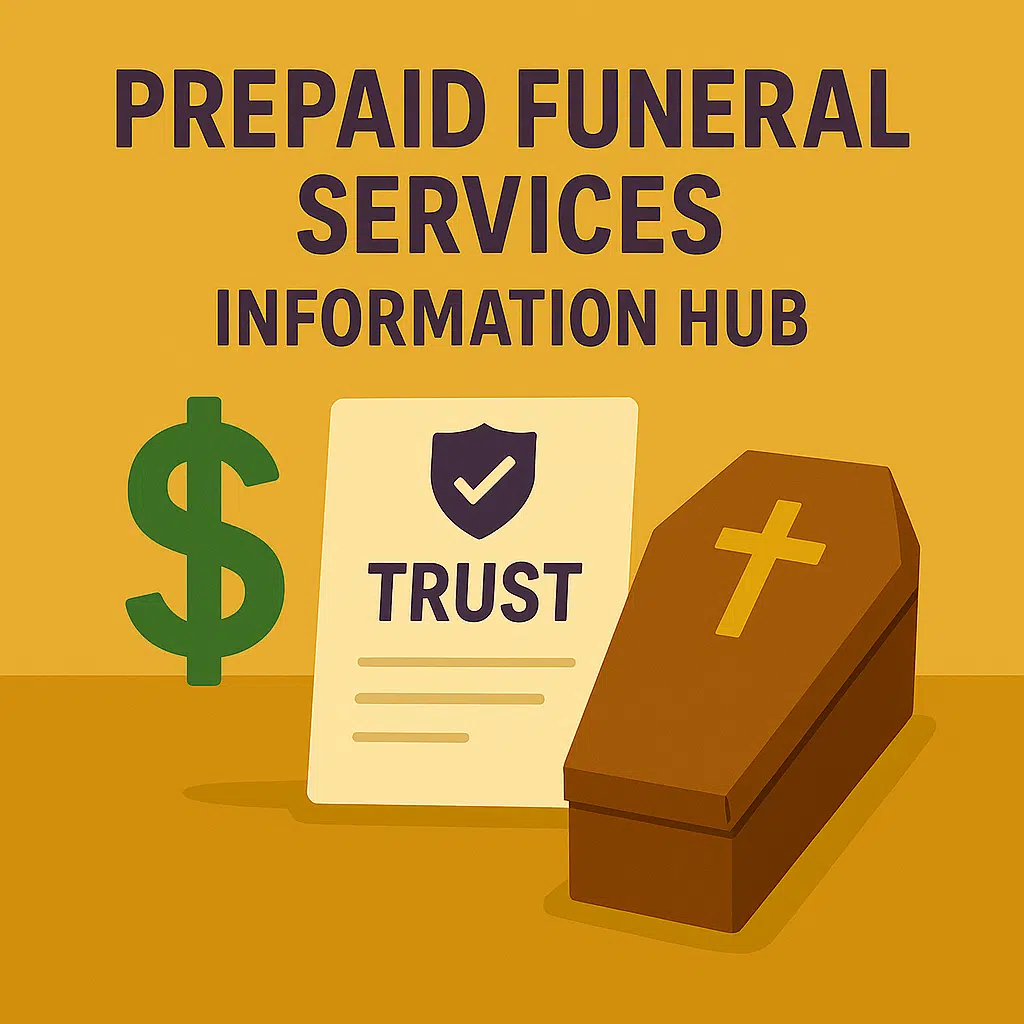Prepaid Funeral Services Information Hub
Planning ahead with a prepaid funeral plan lets you lock in today’s prices and specify exactly how you want your farewell handled. In this hub you’ll find clear explanations of what’s covered, how payment options and refund policies work, and tips for choosing a reputable provider. Whether you want to spare your loved ones financial stress or ensure your wishes are met, this guide will take you from learning the basics to selecting the right plan for peace of mind.

Key Things To Know
Here are the key things to know about prepaid funeral services, so you can plan with confidence. Note that prepaid funeral services are often called “preneed” in the funeral profession, so you may see both terms used interchangeably.
- What It Covers: Prepaid funeral services let you arrange and pay for your funeral in advance, covering everything from the service itself to merchandise like caskets and urns.
- Provider Specific: Your plan is tied to a chosen funeral home, so the services you select will be honored by that provider when the time comes.
- Price Guarantee: Prepaying locks in today’s prices for services and merchandise, protecting you from future cost increases.
- Payment Options: You can pay in full up front or spread payments out over time with a payment plan that fits your budget.
- Funding Mechanisms: Funds are typically held in a trust or annuity, which in many cases can earn interest to help cover rising costs.
- Transferability: If you move or your funeral home closes, most plans can be transferred to another provider or refunded, though terms vary by state.
- Benefit Impacts: Prepaid funds may count against eligibility for need-based benefits such as Medicaid, so it’s wise to discuss funding structures with a financial advisor.
- Consumer Protections: State laws often require funeral providers to place prepaid funds in protected accounts or offer insurance to ensure your money is there when needed.
- Plan Updates: You can usually modify your selections or beneficiaries later on, but changes may incur fees or administrative costs.
Key Features of Prepaid/Preneed Funeral Plans
- 1
Purpose: PreNeed insurance is specifically intended to pay for funeral and burial expenses. It can cover services such as the funeral ceremony, burial plot, casket, headstone, and other associated costs.
- 2
Payment Options: Policies can be paid for in a lump sum or through a series of installment payments over time. Some plans allow for flexible payment schedules to accommodate the policyholder's financial situation.
- 3
Guaranteed Services: Many PreNeed insurance policies come with guarantees that the specified services will be provided regardless of future price increases. This means that the costs are locked in at today's prices, protecting against inflation.
- 4
Beneficiary and Assignments: Typically, the funeral home or service provider is named as the beneficiary of the policy, ensuring that the funds are used specifically for the intended funeral expenses. This arrangement simplifies the process for the family.
- 5
Regulation and Protection: PreNeed insurance is regulated by state laws to protect consumers. Regulations ensure that funds are handled properly and that consumers receive the services they've paid for.
Benefits of Prepaid/Preneed Funeral Planning
- 1
Peace of Mind: Knowing that funeral expenses are covered can provide peace of mind for both the policyholder and their family.
- 2
Financial Protection: It protects the family from having to bear the financial burden of funeral expenses at a time of loss.
- 3
Inflation Protection: By locking in current prices, it helps mitigate the impact of inflation on funeral costs.
- 4
Personalization: It allows individuals to plan and personalize their funeral services according to their preferences.
What Are The Differences Between Funeral Insurance And Preneed/Preplanning
While both funeral insurance and preneed/preplanning aim to ease the financial and emotional burden of end-of-life arrangements, they work in distinct ways. Understanding the differences can help you choose the option that best fits your needs.
| Feature | Funeral Insurance | Preneed / Preplanning |
|---|---|---|
| What it is | A life insurance policy whose benefit is intended for funeral costs, paid out as a lump sum when you pass away | A direct contract with a funeral home to reserve and price specific services today |
| Who it benefits | Your loved ones, who receive funds to cover final expenses | You and your family, by ensuring your exact wishes and budget are locked in now |
| Payment structure | Fixed premiums paid monthly or annually, for a set term or life | One-time payment or installment plan paid directly to the funeral home |
| Use of funds | Beneficiaries may use the lump sum for any final expenses, not just funeral services | Funds go only toward the services and merchandise you’ve selected in advance |
| Customization | Limited, you choose the benefit amount but not specific service details | High, you pick casket, venue, music, memorial extras and more |
| Protection against price hikes | Indirect, benefit amount may fall short if costs rise faster than expected | Direct, prices for selected services are guaranteed and shielded from inflation |
| Portability | Portable, policy stays with you even if you move or change providers |
Location-specific, contract applies only at the funeral home you choose |
Get Your Prepaid/Preneed Plan In Place
Some preneed plans you can buy directly on a provider's website, while others require working with a licensed agent or funeral-home partner. Below are several of the most respected providers in the industry.
Articles
Frequently Asked Questions
Disclaimer: The information provided on this website and by Buried in Work is for general informational purposes only and should not be considered legal advice. Please consult with a qualified attorney or subject matter expert for advice specific to your situation.




